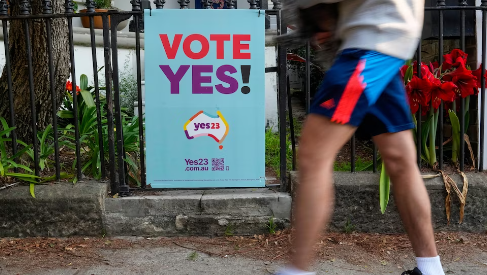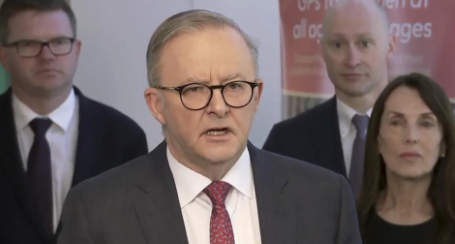Australia’s prime minister says he is confident that Indigenous Australians overwhelmingly support a proposal to create their own representative body to advise Parliament and have it enshrined in the constitutionAustralia’s prime minister said Tuesday he was confident that Indigenous Australians overwhelmingly support a proposal to create their own representative body to advise Parliament and have it enshrined in the constitutionPrime Minister Anthony Albanese's remarks came as Tiwi Islanders cast their votes on making such a constitutional change The Northern Territory News newspaper reported that every voter its reporter spoke to in the largest Tiwi Island community, Wurrumiyanga, on Tuesday supported the Voice
The Oct. 14 referendum of all Australian voters is to decide on having the so-called Indigenous Voice to Parliament enshrined in the constitutioncertainly confident that Indigenous Australians will overwhelming be voting ‘yes’ in this referendum,” Albanese told reporters in the city of Adelaide. He said his confidence was based on opinion polling and his interactions with Indigenous people in remote Outback locationsThey were among the first in early polling that began this week in remote Outback communities, many with significant Indigenous populations We need to move on instead of staying in one place (with) nothing happening. We’re circling around doing the same things,” Tiwi Islander Marie Carmel Kantilla, 73, told the newspaper
He blamed disinformation and misinformation campaigns for polls showing that a majority of Australians oppose the VoiceSome observers argue the referendum was doomed when the major conservative opposition parties decided to oppose the Voice. Opposition lawmakers argue it would divide the nation along racial lines and create legal uncertainty because the courts might interpret the Voice’s constitutional powers in unpredictable ways What has occurred during this campaign is a lot of information being put out there — including by some who know that it is not true,” Albanese

Referendum has ever passed without bipartisan support of the major political parties in the Australian constitution’s 122-year history Leading “no” campaigner Warren Mundine rejected polling commissioned by Voice advocates that found more than 80% of Indigenous people supported the Voice. Mundine fears the Voice would be dominated by Indigenous representatives hand-picked by urban elites He also shares many of the opposition parties' objections to the Voice Many Aboriginals have never heard of the Voice, especially those in remote and regional Australia who are most in need,” Mundine, an Indigenous businessman and former political candidate for an opposition party, told the National Press Club
Indigenous Australians account for only 3.8% of Australia’s population so are not expected to have a major impact on the result of the vote. They are also Australia’s most disadvantaged ethnic minorityVoice proponents hope to give them more say on government policies that affect their livesIn the three weeks until Oct. 14, Australian Electoral Commission teams will crisscross the country collecting votes at 750 remote outposts, some with as few as 20 votersThe first was the Indigenous desert community of Lajamanu, population 600, in the Northern Territory on Monday Australian Electoral Commissioner Tom Roger on Tuesday visited Indigenous communities on the Tiwi Islands off the Northern Territory's coast.
This is despite the “yes” campaign spending more on online advertising in recent months than the “no” campaign. The “no” campaign's ads targeted two states regarded as most likely to vote “yes” — South Australia, where Albanese visited on Tuesday, and TasmaniaAndrea Carson, a La Trobe University political scientist who is part of a team monitoring the referendum debate, said both sides were spreading misinformation and disinformation. Her team found through averaging of published polls that the “no” case led the “yes” case 58% to 42% nationally — and that the gap continues to widen “yes” or “no” vote to win in the referendum, it needs what is known as a double majority — a simple majority of votes across the nation and also a majority of votes in four of Australia's six states

